吉林大学:《大学英语泛读》课程PPT教学课件(book 3)Unit 4 The Lucky Archaeologist

Unit 2 4.The Lucky Archaeologist
Unit 2 4.The Lucky Archaeologist

Contents Information Related to the Text Text Analysis Exercises Questions for Consideration
Contents Information Related to the Text Text Analysis Exercises Questions for Consideration
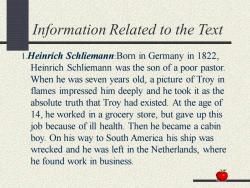
Information Related to the Text 1.Heinrich Schliemann:Born in Germany in 1822, Heinrich Schliemann was the son of a poor pastor. When he was seven years old,a picture of Troy in flames impressed him deeply and he took it as the absolute truth that Troy had existed.At the age of 14,he worked in a grocery store,but gave up this job because of ill health.Then he became a cabin boy.On his way to South America his ship was wrecked and he was left in the Netherlands,where he found work in business
Information Related to the Text 1.Heinrich Schliemann:Born in Germany in 1822, Heinrich Schliemann was the son of a poor pastor. When he was seven years old, a picture of Troy in flames impressed him deeply and he took it as the absolute truth that Troy had existed. At the age of 14, he worked in a grocery store, but gave up this job because of ill health. Then he became a cabin boy. On his way to South America his ship was wrecked and he was left in the Netherlands, where he found work in business
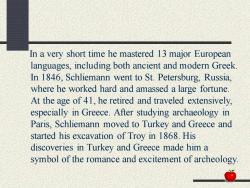
In a very short time he mastered 13 major European languages,including both ancient and modern Greek In 1846,Schliemann went to St.Petersburg,Russia, where he worked hard and amassed a large fortune. At the age of 41,he retired and traveled extensively, especially in Greece.After studying archaeology in Paris,Schliemann moved to Turkey and Greece and started his excavation of Troy in 1868.His discoveries in Turkey and Greece made him a symbol of the romance and excitement of archeology
In a very short time he mastered 13 major European languages, including both ancient and modern Greek. In 1846, Schliemann went to St. Petersburg, Russia, where he worked hard and amassed a large fortune. At the age of 41, he retired and traveled extensively, especially in Greece. After studying archaeology in Paris, Schliemann moved to Turkey and Greece and started his excavation of Troy in 1868. His discoveries in Turkey and Greece made him a symbol of the romance and excitement of archeology
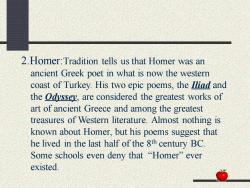
2.Homer:Tradition tells us that Homer was an ancient Greek poet in what is now the western coast of Turkey.His two epic poems,the lliad and the Odussey,are considered the greatest works of art of ancient Greece and among the greatest treasures of Western literature.Almost nothing is known about Homer,but his poems suggest that he lived in the last half of the 8th century BC Some schools even deny that "Homer"ever existed
2.Homer:Tradition tells us that Homer was an ancient Greek poet in what is now the western coast of Turkey. His two epic poems, the Iliad and the Odyssey, are considered the greatest works of art of ancient Greece and among the greatest treasures of Western literature. Almost nothing is known about Homer, but his poems suggest that he lived in the last half of the 8th century BC. Some schools even deny that “Homer” ever existed
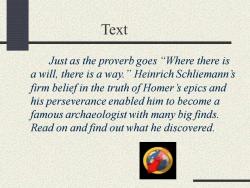
Text Just as the proverb goes "Where there is a will,there is a way."Heinrich Schliemann's firm beliefin the truth of Homer's epics and his perseverance enabled him to become a famous archaeologist with many big finds. Read on and find out what he discovered
Text Just as the proverb goes “Where there is a will, there is a way.” Heinrich Schliemann’s firm belief in the truth of Homer’s epics and his perseverance enabled him to become a famous archaeologist with many big finds. Read on and find out what he discovered

When he was a hungry,unhappy little boy Heinrich Schliemann had heard the story of Troy.An old man had read him the poems of Homer.He accepted them at once as true stories and he never changed his mind,and from that time he was determined to see the city himself.This became his main object in life. 2. Homer's story was about the great King Priam of Troy. Priam's son,Paris.stole Helen,the beautiful wife of another king called Menelaus.Helen of Troy has never been forgotten Her beauty started a long war between two Greek cities.but nobody blames her:Homer praised her great beauty,and she is admired for being the most beautiful woman in history
1. When he was a hungry, unhappy little boy Heinrich Schliemann had heard the story of Troy. An old man had read him the poems of Homer. He accepted them at once as true stories and he never changed his mind, and from that time he was determined to see the city himself. This became his main object in life. 2. Homer’s story was about the great King Priam of Troy. Priam’s son, Paris, stole Helen, the beautiful wife of another king, called Menelaus. Helen of Troy has never been forgotten. Her beauty started a long war between two Greek cities, but nobody blames her; Homer praised her great beauty, and she is admired for being the most beautiful woman in history

3 When Helen was captured Menelaus collected his friends together.and with the King of Mycenae,whose name was Agamemnon,he sailed to Troy.However,Priam refused to return Helen and so the long war began.Both sides fought with courage for years,but the Greeks were unable to break through the huge walls of Troy. 4.Eventually they decided on a trick.They built a great. hollow wooden horse outside the city,and the Trojans believed this was some holy treasure valued by the Greeks. During the fighting,therefore,the Trojans stole the horse and dragged it inside the city,not knowing that a few Greeks were hidden inside the horse
3. When Helen was captured Menelaus collected his friends together, and with the King of Mycenae, whose name was Agamemnon, he sailed to Troy. However, Priam refused to return Helen and so the long war began. Both sides fought with courage for years, but the Greeks were unable to break through the huge walls of Troy. 4. Eventually they decided on a trick. They built a great, hollow, wooden horse outside the city, and the Trojans believed this was some holy treasure valued by the Greeks. During the fighting, therefore, the Trojans stole the horse and dragged it inside the city, not knowing that a few Greeks were hidden inside the horse
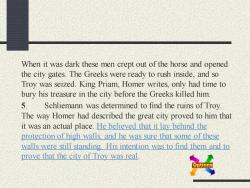
When it was dark these men crept out of the horse and opened the city gates.The Greeks were ready to rush inside,and so Troy was seized.King Priam,Homer writes,only had time to bury his treasure in the city before the Greeks killed him 5.Schliemann was determined to find the ruins of Troy. The way Homer had described the great city proved to him that it was an actual place.He believed that it lay behind the protection of high walls,and he was sure that some of these walls were still standing.His intention was to find them and to prove that the city of Troy was real
When it was dark these men crept out of the horse and opened the city gates. The Greeks were ready to rush inside, and so Troy was seized. King Priam, Homer writes, only had time to bury his treasure in the city before the Greeks killed him. 5. Schliemann was determined to find the ruins of Troy. The way Homer had described the great city proved to him that it was an actual place. He believed that it lay behind the protection of high walls, and he was sure that some of these walls were still standing. His intention was to find them and to prove that the city of Troy was real
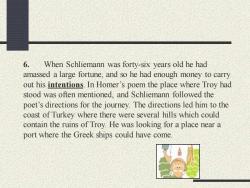
6. When Schliemann was forty-six years old he had amassed a large fortune,and so he had enough money to carry out his intentions.In Homer's poem the place where Troy had stood was often mentioned,and Schliemann followed the poet's directions for the journey.The directions led him to the coast of Turkey where there were several hills which could contain the ruins of Troy.He was looking for a place near a port where the Greek ships could have come
6. When Schliemann was forty-six years old he had amassed a large fortune, and so he had enough money to carry out his intentions. In Homer’s poem the place where Troy had stood was often mentioned, and Schliemann followed the poet’s directions for the journey. The directions led him to the coast of Turkey where there were several hills which could contain the ruins of Troy. He was looking for a place near a port where the Greek ships could have come
按次数下载不扣除下载券;
注册用户24小时内重复下载只扣除一次;
顺序:VIP每日次数-->可用次数-->下载券;
- 吉林大学:《大学英语泛读》课程PPT教学课件(book 3)Unit 3 Romantic Roundabout.ppt
- 吉林大学:《大学英语泛读》课程PPT教学课件(book 3)Unit 2 Why Not Speed Up Your Reading?.ppt
- 吉林大学:《大学英语泛读》课程PPT教学课件(book 3)Unit 1 Reading for A’s.ppt
- 吉林大学:《商务英语选读》课程电子教案(PPT课件)Unit 8 Text c Case Study - Oral Communication.ppt
- 吉林大学:《商务英语选读》课程电子教案(PPT课件)Unit 8 Text b Case Study - Communication Skills.ppt
- 吉林大学:《商务英语选读》课程电子教案(PPT课件)Unit 8 Text a Guides to Good Intercultural Communication.ppt
- 吉林大学:《商务英语选读》课程电子教案(PPT课件)Unit 7 Text c Cultural Differences.ppt
- 吉林大学:《商务英语选读》课程电子教案(PPT课件)Unit 7 Text b Written Communication.ppt
- 吉林大学:《商务英语选读》课程电子教案(PPT课件)Unit 7 Text a Barrier to International communication.ppt
- 吉林大学:《商务英语选读》课程电子教案(PPT课件)Unit 6 Text c Culture and Communication.ppt
- 吉林大学:《商务英语选读》课程电子教案(PPT课件)Unit 6 Text b Business Communication.ppt
- 吉林大学:《商务英语选读》课程电子教案(PPT课件)Unit 6 Text a How to Understand Body Language.ppt
- 吉林大学:《商务英语选读》课程电子教案(PPT课件)Unit 5 Text c Good Body Language Is Part of Good Communication.ppt
- 吉林大学:《商务英语选读》课程电子教案(PPT课件)Unit 5 Text b Nonverbal Communication.ppt
- 吉林大学:《商务英语选读》课程电子教案(PPT课件)Unit 5 Text a Oral Presentation.ppt
- 吉林大学:《商务英语选读》课程电子教案(PPT课件)Unit 4 Text c How to Argue.ppt
- 吉林大学:《商务英语选读》课程电子教案(PPT课件)Unit 4 Text b Sharpening Your Basic Skills.ppt
- 吉林大学:《商务英语选读》课程电子教案(PPT课件)Unit 4 Text a Suggestions for Effective Listening.ppt
- 吉林大学:《商务英语选读》课程电子教案(PPT课件)Unit 3 Text c The Importance of Listening.ppt
- 吉林大学:《商务英语选读》课程电子教案(PPT课件)Unit 3 Text b How Can You Develop Effective Communication Skills?.ppt
- 吉林大学:《大学英语泛读》课程PPT教学课件(book 3)Unit 5 News of the Engagement.ppt
- 吉林大学:《大学英语泛读》课程PPT教学课件(book 3)Unit 6 The Story of Jazz.ppt
- 吉林大学:《大学英语泛读》课程PPT教学课件(book 3)Unit 7 The Experiences of a Chinese Immigrant, 1880-1903.ppt
- 吉林大学:《大学英语泛读》课程PPT教学课件(book 3)Unit 8 How to Guess Your Age.ppt
- 吉林大学:《大学英语泛读》课程PPT教学课件(book 3)Unit 9 The Sixth Sense.ppt
- 吉林大学:《大学英语泛读》课程PPT教学课件(book 3)Unit 10 Long Walk to Forever.ppt
- 吉林大学:《大学英语泛读》课程PPT教学课件(book 3)Unit 11 Father and Son.ppt
- 吉林大学:《大学英语泛读》课程PPT教学课件(book 3)Unit 13 I Thought About This Girl.ppt
- 吉林大学:《大学英语泛读》课程PPT教学课件(book 3)Unit 14 The Gift of understanding.ppt
- 吉林大学:《大学英语泛读》课程PPT教学课件(book 3)Unit 15 A Horrible Experience.ppt
- 吉林大学:《大学英语泛读》课程PPT教学课件(book 3)Unit 16 Exercise and Health(一).ppt
- 吉林大学:《大学英语泛读》课程PPT教学课件(book 3)Unit 17 Exercise and Health(二).ppt
- 吉林大学:《大学英语泛读》课程PPT教学课件(book 3)Unit 18 My Sixth Christmas.ppt
- 吉林大学:《大学英语泛读》课程PPT教学课件(book 3)Unit 19 The Sacrifice at Masada.ppt
- 吉林大学:《大学英语泛读》课程PPT教学课件(book 3)Unit 20 Covered Wagon Days.ppt
- 吉林大学:《大学英语泛读》课程PPT教学课件(book 3)Unit 21 Education? Computer, Naturally.ppt
- 吉林大学:《大学英语泛读》课程PPT教学课件(book 3)Unit 22 Living as a Navajo.ppt
- 吉林大学:《大学英语泛读》课程PPT教学课件(book 3)Unit 23 Picnic in the Dining-Room.ppt
- 吉林大学:《大学英语泛读》课程PPT教学课件(book 3)Unit 24 The Model Millionaire.ppt
- 吉林大学:《大学英语泛读》课程PPT教学课件(book 3)Unit 25 Make Today Count.ppt
